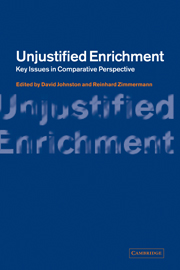Book contents
- Frontmatter
- Contents
- List of contributors
- Preface
- Table of cases
- List of abbreviations
- I Introduction
- II Enrichment ‘without legal ground’ or unjust factor approach
- III Failure of consideration
- IV Duress and fraud
- V Change of position
- VI Illegality
- VII Encroachment and restitution for wrongs
- 12 Reflections on the role of restitutionary damages to protect contractual expectations
- 13 Encroachments: between private and public
- VIII Improvements
- IX Discharge of another person's debt
- X Third-party enrichment
- XI Proprietary issues
- XII Taxonomy
- Index
12 - Reflections on the role of restitutionary damages to protect contractual expectations
Published online by Cambridge University Press: 31 July 2009
- Frontmatter
- Contents
- List of contributors
- Preface
- Table of cases
- List of abbreviations
- I Introduction
- II Enrichment ‘without legal ground’ or unjust factor approach
- III Failure of consideration
- IV Duress and fraud
- V Change of position
- VI Illegality
- VII Encroachment and restitution for wrongs
- 12 Reflections on the role of restitutionary damages to protect contractual expectations
- 13 Encroachments: between private and public
- VIII Improvements
- IX Discharge of another person's debt
- X Third-party enrichment
- XI Proprietary issues
- XII Taxonomy
- Index
Summary
Introduction
This chapter considers the suggestion made by the English Court of Appeal in Attorney-General v. Blake that a restitutionary measure of damages for breach of contract might exceptionally be justified, in cases where the normal compensatory measure of damages is deficient or unsatisfactory. In the words of Lord Woolf MR, delivering the judgment of the Court:
[i]f the court is unable to award restitutionary damages for breach of contract, then the law of contract is seriously deficient. It means that in many situations the plaintiff is deprived of any effective remedy for breach of contract, because of a failure to attach any value to the plaintiff's legitimate interests in having the contract duly performed.
It will be suggested that a restitutionary measure of damages for breach of contract cannot be justified solely on this basis and that it would be more transparent, accurate and appropriate to tackle deficiencies in the compensatory measure directly.
Background
Until Blake, English law was tolerably clear. The role of restitution in cases of contractual default was limited to autonomous ‘subtraction’ claims, such as the paradigm case of the recovery of money on the ground of total failure of consideration, following discharge of a contract for repudiatory breach.
- Type
- Chapter
- Information
- Unjustified EnrichmentKey Issues in Comparative Perspective, pp. 327 - 347Publisher: Cambridge University PressPrint publication year: 2002
- 1
- Cited by



